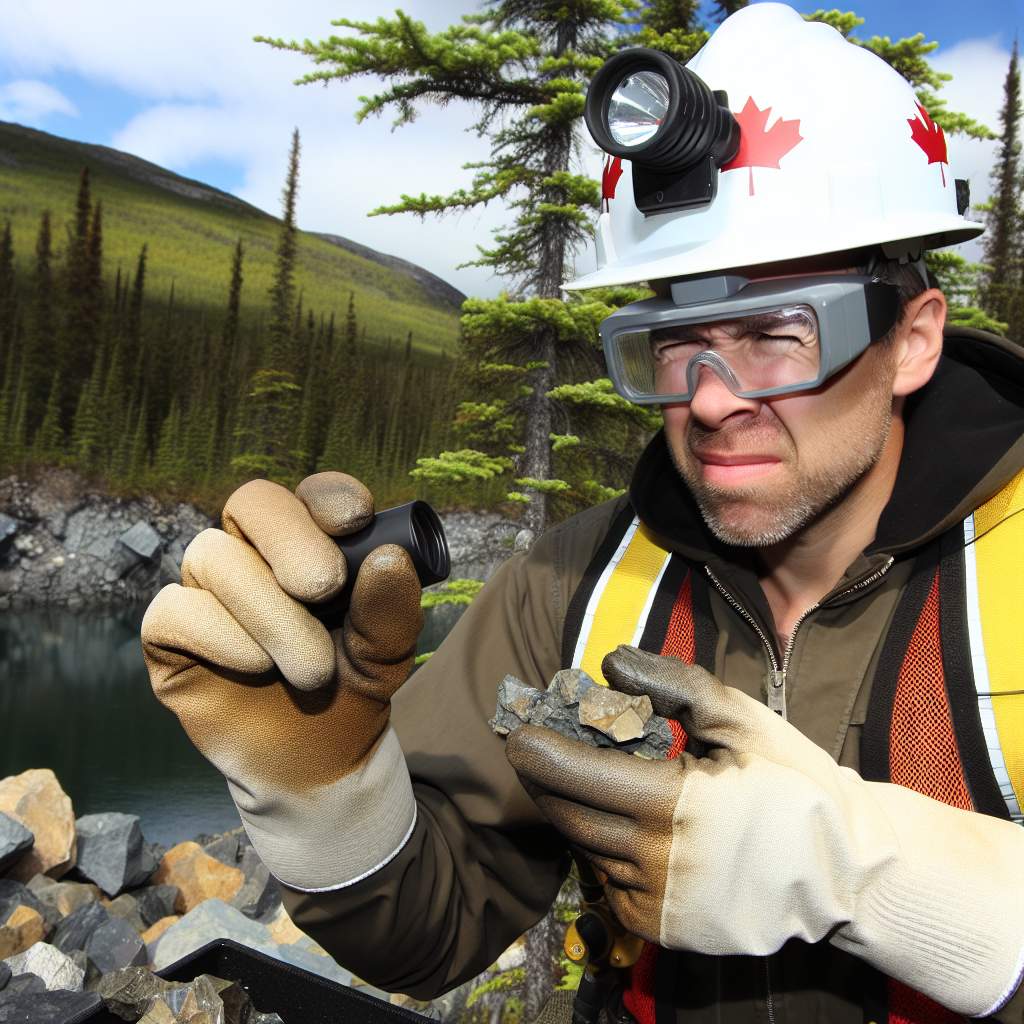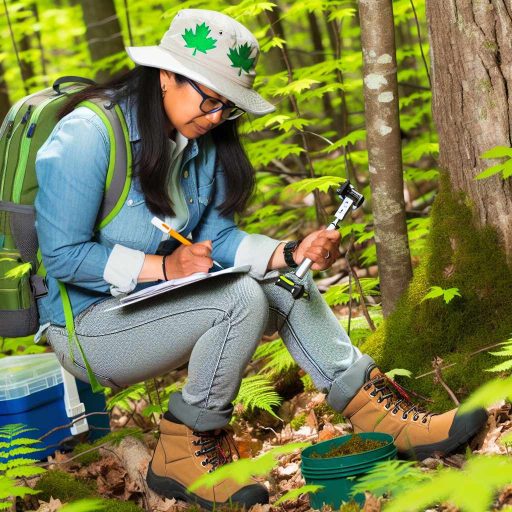Introduction to Geology and its Importance
Geology is the study of the Earth and its processes.
It encompasses the history, materials, and structure of our planet.
Understanding geology helps us comprehend natural phenomena.
For instance, we can learn about earthquakes, volcanic eruptions, and landslides.
Moreover, geology plays a significant role in resource management.
It guides the extraction of essential resources like minerals and fossil fuels.
Additionally, geology informs environmental conservation strategies.
This field helps assess natural hazards and their impacts on communities.
Furthermore, geology contributes to the understanding of climate change.
Through studying Earth’s history, we can predict future changes.
Geologists also engage in research that benefits public policy decisions.
For example, their work influences land use planning and environmental regulations.
In essence, geology is fundamental to our understanding of the Earth.
It impacts various industries, including construction, energy, and agriculture.
Thus, pursuing a career in geology offers diverse opportunities and challenges.
Overview of Popular Geology Specializations
Field of Geology
Geology is a diverse field with numerous specializations.
Each specialization focuses on different aspects of Earth science.
These include studying rocks, minerals, and geological processes.
Additionally, geology helps us understand natural resources and hazards.
Environmental Geology
Environmental geology examines the interactions between people and the Earth.
This specialization addresses issues like pollution and land use.
Professionals assess environmental impacts of construction projects.
They also develop strategies for sustainable land management.
Paleontology
Paleontology focuses on the study of fossils and ancient life forms.
Experts in this field reconstruct past ecosystems and climates.
Unlock Your Career Potential
Visualize a clear path to success with our tailored Career Consulting service. Personalized insights in just 1-3 days.
Get StartedThey contribute to our understanding of evolution over time.
Paleontologists often work in museums or conduct field research.
Hydrogeology
Hydrogeology studies groundwater and its movement through soil and rock.
This specialization is crucial for managing water resources.
Professionals work on projects related to water quality and availability.
They often collaborate with government agencies and environmental organizations.
Geochemistry
Geochemistry investigates the chemical composition of Earth materials.
This specialization is essential for understanding mineral formation.
Geochemists analyze soil, water, and rock samples for various pollutants.
Their work informs environmental cleanup and resource exploration efforts.
Geophysics
Geophysics employs physical principles to study Earth’s properties.
This field utilizes methods like seismic, magnetic, and gravitational studies.
Geophysicists play a vital role in natural resource exploration.
They also assess geohazards such as earthquakes and volcanic activity.
Career Opportunities
Geology offers varied career paths across multiple sectors.
Professionals can work in academia, government, or industry.
Some may focus on research, while others may choose consultancy roles.
Additionally, many geologists work on environmental restoration projects.
Petrology: Study of Rocks and Their Formation
Overview of Petrology
Petrology is the branch of geology that focuses on rocks.
It investigates the origin, composition, and structure of rocks.
This field is crucial for understanding Earth’s processes.
Types of Rocks
Three primary rock types exist: igneous, sedimentary, and metamorphic.
Igneous rocks form from cooled magma or lava.
Sedimentary rocks result from the accumulation of sediments.
Metamorphic rocks arise from existing rocks that undergo transformation.
Methods of Study
Petrologists use various techniques to study rocks.
One common method is fieldwork, which involves collecting rock samples.
Laboratory analysis further examines the chemical and physical properties.
Microscopy enables detailed observation of rock textures.
Importance of Petrology
Petrology plays a vital role in natural resource exploration.
Minerals extracted from rocks are essential for industries.
Additionally, understanding rock formations aids in assessing geological hazards.
Petrology also contributes to environmental studies.
Career Opportunities
A career in petrology offers diverse opportunities.
Many petrologists work in research institutions or universities.
Others find positions in oil and gas companies.
Environmental consulting firms also hire petrologists for assessments.
Learn More: Networking Tips for New Ecologists in Canada
Mineralogy: Understanding Minerals and Their Properties
Introduction to Mineralogy
Mineralogy is the study of minerals, their composition, and properties.
It plays a crucial role in various geological processes.
Understanding minerals helps in resource exploration and exploitation.
Types of Minerals
Minerals can be broadly classified into two categories: silicate and non-silicate minerals.
Silicate minerals contain silicon and oxygen, which are abundant in the Earth’s crust.
Common examples include quartz, feldspar, and mica.
Non-silicate minerals include carbonates, oxides, and sulfides.
They feature distinct chemical properties and structures.
Physical Properties of Minerals
Each mineral exhibits unique physical properties that help in its identification.
Color is often the first noticeable property, but it can be deceptive.
Hardness measures a mineral’s resistance to scratching, defined by the Mohs scale.
Luster describes how a mineral reflects light, characterized as metallic or non-metallic.
Streak is the color of a mineral in powdered form and aids in identification.
Chemical Properties of Minerals
Chemical properties provide insight into the mineral’s composition and behavior.
Minerals can react with acids, helping to identify carbonate minerals like calcite.
Solubility defines how well a mineral dissolves in a solvent.
Understanding these properties is vital for mineral classification.
The Role of Mineralogists
Mineralogists study and identify minerals through various techniques.
They use tools like microscopes and X-ray diffraction for accurate analysis.
Additionally, mineralogists collaborate with geologists in field studies.
This collaboration enhances our understanding of earth processes.
Applications of Mineralogy
Mineralogy has practical applications in various industries.
Mining industries rely heavily on mineralogical studies for exploration.
Additionally, mineralogy contributes to the fields of environmental geology and materials science.
It also aids in the development of new technologies through the study of materials.
Understanding minerals is essential for numerous scientific and industrial applications.
Uncover the Details: The Connection Between Oceanography and Global Science
Geophysics: Using Physics to Study Earth’s Structure
Introduction to Geophysics
Geophysics focuses on understanding the Earth through the principles of physics.
This field combines various disciplines, including geology, physics, and mathematics.
Geophysicists analyze physical properties of the Earth to uncover its structure.
Key Methods in Geophysics
Geophysical methods utilize several techniques to gather information.
- Seismic methods involve analyzing waves generated by earthquakes or artificial sources.
- Magnetic surveys measure variations in the Earth’s magnetic field.
- Gravity surveys assess differences in gravitational pull across locations.
- Electrical resistivity methods evaluate how well the Earth conducts electricity.
Applications of Geophysics
Geophysics plays a vital role in various industries and research areas.
In natural resource exploration, geophysicists guide the search for oil, gas, and minerals.
Environmental assessments benefit from geophysical techniques to identify contamination.
Additionally, geophysics aids in understanding natural hazards like earthquakes and volcanoes.
Career Opportunities in Geophysics
A degree in geophysics opens many exciting career paths.
Some geophysicists work for energy companies, focusing on resource extraction.
Others join government agencies for research and regulatory roles.
Research institutions and universities also employ geophysicists to advance scientific knowledge.
Skills Required for Success
Successful geophysicists possess a strong analytical mindset.
Proficiency in using software for data analysis is essential.
Fieldwork skills are vital for conducting surveys and gathering data.
Communication skills help present complex findings clearly.
Discover More: Steps to Land a Job as a Geneticist in Canada
Environmental Geology: Addressing Environmental Issues
Defining Environmental Geology
Environmental geology focuses on interactions between humans and the Earth.
It studies natural processes and human impacts on the geological environment.
This specialization helps in understanding risks associated with geological hazards.
Moreover, it aids in sustainable resource management.
Key Roles in Environmental Geology
Environmental geologists perform various vital roles.
They conduct assessments to evaluate contamination in soils and groundwater.
Additionally, they engage in land use planning to prevent ecological degradation.
Another essential role involves developing strategies for waste management.
Skills Required for Success
Professionals need strong analytical skills to interpret geological data.
Furthermore, they must possess excellent communication abilities.
Interpersonal skills are crucial for collaborating with various stakeholders.
Adaptability is also vital, as environmental challenges frequently change.
Career Opportunities in Environmental Geology
Many career paths exist within this specialization.
- Consulting firms often hire environmental geologists for project evaluation.
- Government agencies employ specialists to regulate land use and pollution control.
- Nonprofit organizations seek professionals for environmental advocacy work.
- Universities and research institutions offer academic positions focusing on environmental geology.
Impact on Environmental Policy
Environmental geologists contribute significantly to shaping policies.
Their research informs regulations aimed at protecting natural resources.
Additionally, they provide data for risk assessment regarding natural disasters.
This work ultimately supports the creation of sustainable communities.
You Might Also Like: Essential Fieldwork Tips for Wildlife Biologists
Hydrogeology: The Study of Groundwater and Its Resources
Overview of Hydrogeology
Hydrogeology focuses on the distribution of groundwater.
This field examines water in soil and rock formations.
It plays a vital role in managing water resources.
Additionally, hydrogeologists assess aquifer systems.
Importance of Groundwater
Groundwater is essential for drinking water supply.
It supports agriculture and industrial processes.
Moreover, groundwater helps maintain ecosystems.
It acts as a buffer against drought conditions.
Key Techniques in Hydrogeology
Hydrogeologists employ various methods to study groundwater.
One common technique is groundwater modeling.
This process simulates groundwater flow and behavior.
Additionally, hydrogeologists use geophysical surveys.
These surveys help identify subsurface water structures.
Career Opportunities in Hydrogeology
Hydrogeologists can work in multiple sectors.
They may be employed by government agencies.
Private consulting firms also seek these experts.
Environmental organizations value their skills as well.
Future Directions in Hydrogeology
Studying hydrogeology opens many career paths.
It addresses crucial water resource challenges.
Ultimately, hydrogeologists contribute to sustainable management.

Seismology: Analyzing Earthquakes and Earth’s Internal Processes
Introduction to Seismology
Seismology is the study of earthquakes and seismic waves.
It helps us understand the Earth’s internal processes.
This field provides insights into tectonic movements.
Furthermore, it has implications for natural disaster preparedness.
Roles and Responsibilities of Seismologists
Seismologists monitor seismic activity worldwide.
They analyze data from seismic stations to detect earthquakes.
Additionally, they model and predict seismic events.
This work aids in minimizing risks to communities.
Career Opportunities in Seismology
Various career paths exist within seismology.
Seismologists can work for government agencies like the United States Geological Survey.
They may also join private research firms or non-profit organizations.
In academia, they can teach and conduct research.
Some seismologists participate in international projects.
These collaborations often enhance global seismic safety.
Tools and Technologies Used in Seismology
Seismologists use specialized instruments for their work.
Seismographs measure and record seismic waves.
Geographic Information Systems (GIS) also play a crucial role.
They help visualize earthquake data on maps.
Advanced software allows for complex data analysis.
This technology assists in modeling earthquake scenarios.
Ultimately, these tools contribute significantly to research efforts.
Impacts of Seismology on Society
Seismology has a profound impact on public safety.
It informs building codes and construction practices.
Consequently, this reduces earthquake vulnerabilities in urban areas.
Education and outreach programs raise awareness.
They empower communities to prepare for potential earthquakes.
Moreover, seismology plays a role in emergency response strategies.
Career Opportunities in Geology: Industry, Academia, and Research
Industry Opportunities
Geology offers numerous career paths in the private sector.
Many companies seek geologists for resource exploration.
Mining companies often hire geologists for mineral exploration.
They analyze geological data to determine profitable sites.
Oil and gas industries also employ geologists for hydrocarbon exploration.
These professionals assess geological formations for resource potential.
Environmental consulting firms require geologists for assessments.
They evaluate the environmental impacts of projects and regulations.
Academic Opportunities
Academia provides another valuable career path for geologists.
Many universities seek geologists for teaching and research positions.
Professors educate students while conducting scientific studies.
Additionally, they can secure grants for innovative research projects.
Geologists in academia often collaborate with various institutions.
These collaborations can lead to advancements in the field.
Research Opportunities
Research institutes actively recruit geologists to advance knowledge.
Many government agencies hire geologists for research purposes.
These professionals conduct studies related to earth sciences.
They may work on climate change, resource management, or natural disasters.
Researchers also publish their findings in scientific journals.
This helps disseminate knowledge and contribute to the field.
Specialized Roles in Geology
Geology has a variety of specialized roles available to professionals.
Environmental geologists focus on environmental protection and remediation.
Hydrogeologists study groundwater and its effects on ecosystems.
Engineering geologists support construction projects with geological advice.
Further, geophysicists apply physics principles to resolve earth-related issues.
Thus, geologists can choose an area that aligns with their interests.
Required Education and Skills for Geology Professionals
Educational Pathways
A bachelor’s degree in geology or a related field is essential for entry-level positions.
This degree typically includes courses in mineralogy, paleontology, and geophysics.
Many aspiring geologists choose to pursue a master’s degree for advanced opportunities.
A Ph.D. is often necessary for research and university-level teaching roles.
Programs may offer specializations in areas like hydrology, geochemistry, or environmental geology.
Essential Skills
Strong analytical skills are fundamental for geology professionals.
Geologists must be able to interpret data from various sources effectively.
Fieldwork demands physical stamina and the ability to work in remote locations.
Additionally, proficiency in using geological software is increasingly valuable.
A solid understanding of environmental regulations enhances employability.
Interpersonal and Communication Skills
Effective communication skills are crucial for presenting research findings.
Collaboration with multidisciplinary teams is common in geology projects.
Public outreach and education may form part of a geologist’s responsibilities.
Thus, the ability to translate complex concepts into understandable terms is important.
Technical Proficiency
A familiarity with GIS (Geographic Information Systems) software is often required.
Data analysis skills, particularly in statistics, are increasingly necessary.
Field studies often involve advanced equipment like GPS devices and sampling tools.
Moreover, understanding laboratory techniques can set candidates apart.
Certifications and Licenses
Obtaining a Professional Geologist (PG) license can enhance career prospects.
Many states require this license for independent practice and consulting roles.
Certain certifications, like Certified Engineering Geologist, may also apply.
Continuing education helps professionals stay updated on industry standards.
Emerging Trends in Geology and Future Career Prospects
Technological Advancements
Technology significantly impacts geology today.
Geologists now use advanced software for data analysis.
Machine learning algorithms identify geological patterns.
These innovations enhance predictions about natural resources.
Consequently, geologists must adapt to these new tools.
Environmental Awareness
There’s a growing emphasis on environmental sustainability.
Geologists are key in addressing climate change challenges.
They study the Earth’s processes to understand environmental impacts.
Moreover, they help develop strategies for mitigation and adaptation.
Renewable Energy Focus
Geology plays a crucial role in renewable energy development.
Geothermal and hydrocarbon resources require geological expertise.
As industries shift, geologists will explore new energy sources.
Solar and wind energy installations also benefit from geological assessments.
Career Opportunities in Geology
The demand for geologists is on the rise.
New roles are emerging due to advancements in technology.
Positions in environmental consulting are gaining traction.
Similarly, renewable energy sectors seek skilled geologists.
Moreover, academic research and education continue to expand.
Interdisciplinary Approach
Geology increasingly overlaps with other fields.
Collaboration with environmental scientists is essential.
This interdisciplinary approach enhances problem-solving capabilities.
Geologists work with engineers to assess natural hazards.
Overall, this broadens their career prospects significantly.
Global Perspective
Geology has a global impact on society.
Geologists may work internationally on various projects.
They contribute to understanding geological processes worldwide.
This global perspective fosters intercultural collaboration.
Furthermore, it enhances their professional network.
Additional Resources
Department of Earth and Atmospheric Sciences: Indiana University …




